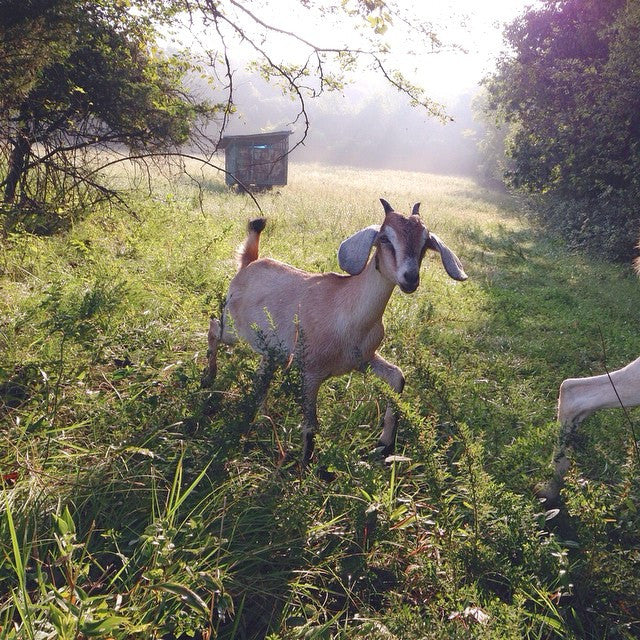
I've always loved the concept of using animals as lawn mowers. Since well before we had any animals I dreamed of ruminants grazing the lawn and never having to worry about a mower.
So when I saw our pals at Rough Draft Farmstead posting about their Lambmowers and simultaneously engaging in a "animals as lawn mowers" conversation with a Facebook follower, I got back to day dreaming about the day when lawn mowing and weed whacking would not be necessary.
Because of the way our property fenced and many other reasons, we have a relatively big lawn (for us). In actuality, our lawn is tiny compared to everyone else around here, but it still seems huge to me. Every second I spend maintaining the damn thing I think about all the other stuff I could be doing if an animal would just eat it all instead. Not only that, but if an animal ate our lawn we would get something in return, whether it be meat, milk, wool, or just pure entertainment.
One day I think we'll settle for sheep in the lawn. Why sheep? Well, this gets back to a little of conversation I was having on Facebook. I've spent a long time thinking about the optimal animal to maintain our lawn. So here's some pros and cons of each possibility that I've bounced around in my mind:
Cows
Cows are wonderful animals. They can produce meat, milk, hides, skulls/horns, and so on. They are good grazers and depending on the breed of cow (and how much you feed it) they are more than happy to eat weeds. They will graze forages to within inches of the ground and keep it that way.
Exotics
Exotics are those weird animals that you see sometimes, but not very frequently. Llamas, alpacas, emus, ostrich, etc. I like the idea of llamas or alpacas to some extent. Ostrich are mean and I don't know anything about emu and I don't plan on learning either. Maybe one day we'll have a llama or an alpaca herd. Right now adding another species and learning the ins and outs of caring for them is too much to fathom. I don't like the concept of having to shear them, but perhaps not all of them need it. Who knows?
Goats
Clearly, we love goats and goats are high on the list for animal-mowers. We use them in our lawn on a regular basis, just not enough to keep me from having to mow it.
Pigs
Sheep
Broader issues with all of these considerations are:
Death/Protection
Your animals will die at some point, so be prepared for that. In fact, if they're your first farm animals there's a pretty good chance you'll lose some in the first year, or maybe even first days or weeks. Brace yourself. Many tears were shed on our farm when one of our first chickens died within a couple days from a disease it brought with it.
A key aspect in keeping animals alive is protecting them from predators. We use electric fences and livestock guardian dogs. You'll need something to keep them safe. There's many alternatives, so be sure to think about what works best for you before you bring on a bunch of sheep that look really tasty to just about every wild animal out there.
Healthcare
Water
All animals need fresh water on a regular basis. If they're in your lawn then you probably have a hose nearby and you can easily fill a water trough. If you have a lawn big enough to support the dietary requirements of a ruminant animal then you'll need a very long hose, or you'll be hauling water on a regular basis. Figuring out a watering system is an important consideration.
Winter

